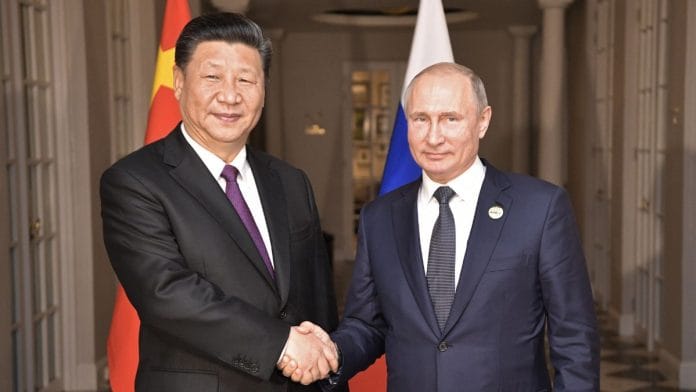Russian President Vladimir Putin has made only one foreign visit in 2024 — unsurprisingly to China. His choice to make the trip immediately after his fifth inauguration as President underscores the evolving dynamics of their alliance, particularly against the backdrop of the Russia-Ukraine conflict, isolation of Moscow, and the China-United States tech and trade war.
China has solidified its position as Russia’s most persistent ally, a role that has been cultivated since the collapse of the Soviet Union. The roots of this partnership go back decades, stemming from China’s conciliatory gestures during border dispute resolution with the post-Soviet states. This laid the groundwork for a cooperative effort to limit the US’ influence in the region, a shared objective that defines the essence of China-Russia relations.
When Putin met Chinese President Xi Jinping in Beijing on 16 May, the presence of the US loomed large as an unspoken third party. In their joint statement, the leaders expressed: “[We] intend to increase interaction and tighten coordination in order to counter Washington’s destructive and hostile course towards the so-called ‘dual containment’ of our countries.”
China’s perspectives on Russia
In China, government officials, state-owned media, and most analysts emphasise that the partnership between Moscow and Beijing does not target any third party. Instead, they put the blame on the US for interference in their internal affairs. They assert that this ‘Comprehensive Strategic Partnership of Coordination for a New Era’ represents an antithesis to the Cold War mentality and the US policy of meddling in other countries. Li Ziguo, the director of the Department for European-Central Asian Studies at the China Institute of International Studies, highlights that as major global powers, China and Russia adhere to principles of non-alliance and non-confrontation, striving to find common ground and challenge the outdated notion that some countries are inevitably destined to compete due to conflicting interests. He even once described the China-Russia strategic partnership as a new model for how major powers should engage and interact.
A commentary on Baidu delineated the reasons for China’s abstention from direct military support for Russia. It underscored that, in contrast to the US, China prioritises resolving international disputes through dialogue and cooperation to uphold world peace and stability, avoiding actions that might escalate into conflict and confrontation. Some analysts have even lauded the steady development of China-Russia relations as conducive to global peace and prosperity. However, a more pragmatic perspective emerged from the another commentary, focusing on mutual benefit. It argues China seeks to showcase its strength in Europe through its alliance with Russia, while Moscow relies on Beijing’s assistance to survive amid Western sanctions.
Chinese social media users offer a range of perspectives on the Russia-China partnership, from critiquing the US to depicting Beijing as a supportive ally to Moscow. While these viewpoints may not entirely align with state media and government stances, discussions on platforms like Weibo reveal diverse opinions. This time, after Putin’s visit, Weibo was full of negative comments on Russia. Several trending posts mentioned Russia’s occupation of Chinese territory, reflecting on past grievances with the Soviet Union.
A widely circulated viewpoint on social media highlights the potential reputational risks for China in its support for Russia. This sentiment is illustrated by a Weibo post drawing attention to China’s financial aid to Russia, suggesting that Beijing may be prioritising Moscow’s interests over its own. In this context, the post argues, to avoid disappointing China, Russia should earnestly consider Beijing’s peace proposal for the conflict, as failure to do so could result in significant consequences for both reputational standing of and tangible support from China.
Another Weibo post referenced a Wall Street Journal Mandarin article that characterised Russia as both ‘a comrade and a problem for China’. Some, like Hu Xijin, former editor-in-chief of the Global Times, still regard Russia as a comrade. He supported Russia by stressing that past experiences should not dictate the present state of China-Russia relations. In a lengthy post on Weibo, he acknowledged that China has faced historical tragedies because of Russia, but the real threat currently comes from the US. This geopolitical urgency remains a pressing concern for China, both now and in the foreseeable future. There has also been consensus that China-Russia relations are significant and that the US has no right to dictate Beijing’s engagement with Moscow.
Also Read: Don’t look at Russia-Ukraine war from Western lens. Moscow isn’t being weakened
Russia is serving China
In 2008, Bobo Lo, a Chinese-Australian scholar, characterised China-Russia relations as an ‘axis of convenience.’ However, there has been a shift in this perception over time. China and Russia are now seen as transcending mere convenience, although this does not imply an unbreakable bond. It is often projected that Russia needs China more than the latter needs the former, but Moscow’s status as a junior partner and its use as a tool against the US serves Beijing’s interests more. For much of the West, Beijing’s proximity to Moscow is still viewed as a leverage point to influence the latter to end the Russia-Ukraine War.
The diminishing positive perception of Russia on certain Chinese platforms underscores a less favourable view than projected of the China-Russia partnership, possibly positioning it more as a liability than an asset for Beijing. Moreover, if China seeks to improve ties with the West, it may need to curtail its engagement with Russia. For now, the optics and frequent exchanges between Xi and Putin provide reassurance. Even though the “no-limits partnership” might not be reflected in the joint statements, in times to come, China and Russia may find themselves flocking together out of necessity.
Sana Hashmi is a fellow at the Taiwan Asia Exchange Foundation and George H W Bush Foundation for US-China Relations. She tweets @sanahashmi. Views are personal.
(Edited by Humra Laeeq)






